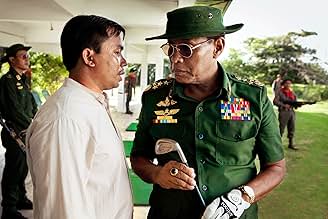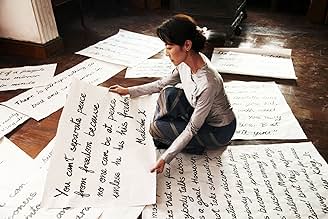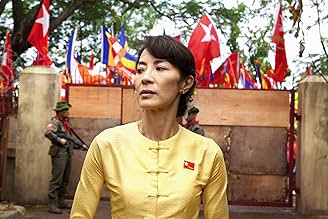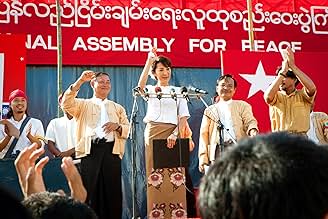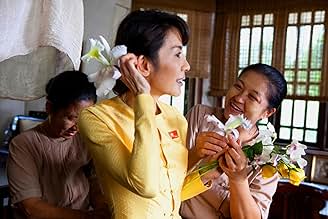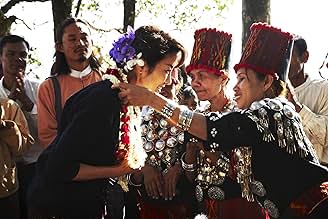Narra la vida de Aung San Suu Kyi, quien se convirtió en líder del movimiento democrático de Burma, siendo víctima durante años de arresto domiciliario, pero apoyada en todo momento por su e... Leer todoNarra la vida de Aung San Suu Kyi, quien se convirtió en líder del movimiento democrático de Burma, siendo víctima durante años de arresto domiciliario, pero apoyada en todo momento por su esposo, el escritor Michael Aris.Narra la vida de Aung San Suu Kyi, quien se convirtió en líder del movimiento democrático de Burma, siendo víctima durante años de arresto domiciliario, pero apoyada en todo momento por su esposo, el escritor Michael Aris.
- Dirección
- Guionista
- Elenco
- Premios
- 3 premios ganados y 2 nominaciones en total
- Dirección
- Guionista
- Todo el elenco y el equipo
- Producción, taquilla y más en IMDbPro
Opiniones destacadas
I would recommend this film to anyone as essential viewing, whether or not you have an interest in political affairs or not. The politics in The Lady is so simply set out and self- explanatory that anyone would understand the issues at hand.
In a story spanning decades that moves forward and back in time, Besson has a solid hand in knowing the highlights of the many years history to translate for the big screen, going back to the 40s when Suu Kyi's father Aung San, a war and independence hero, got assassinated, right down to her emergence in politics as a force to be reckoned with, and her subsequent house arrest, right up to the recent 2007 rallies and demonstrations by monks that eventually led to a deadly crackdown. The Lady presents Besson an opportunity to move away from his relatively family friendly fare of late with the Arthur and the Invisibles series, and also to perform an about turn from the usual action flicks, for something a lot more serious in gravitas, and needless to say the importance of getting the film right in most, if not all counts, as much as a filmmaker can with the resources at his disposal.
As such, some may feel that the film is relatively lightweight in its coverage of politics, although I must add that being confined to one's home in the prominent years of one's political life doesn't make for a smooth translation on screen, as there's only so much that one can do within the fantastic recreation of Suu Kyi's lakeside home. Instead a softer, more heartfelt approach through a love story opened up Suu Kyi as a character who's a lot more down to earth, than just a democracy icon. Besson's knack for handling strong female characters couldn't be more pronounced here, with plenty of opportunities in scenes to show she does not cower even with gun barrels pointed at her face, nor accept the constant nonsense dished out by the military might.
Despite the lack of action, you can feel Luc Besson's release of glee in channeling that frustration to mocking the military top brass, from their deliberate big moments and silly gestures bordering on the comical, to their illogical superstitions, with characterization being very much in line with our esteemed ex Minister Mentor's comments in WikiLeaks. Almost all generalissimos and their underlings are ridiculously decorated, and make extremely naive calls as if nobody can see through their simple rouse. It's a story of grace versus guns, which in any other typical Besson movie it's no surprise if it comes with preference for the latter, except for The Lady which trades in for the softer power approach.
Michelle Yeoh lost quite a lot of weight in order to physically resemble the lead role, and her time spent on researching Suu Kyi was time well spent as she nailed her mimicry down to a pat. Even her lines spoken in Burmese were flawless. Not that I can understand the language, but the large percentage of Burmese audience that I've watched this with were nodding and acknowledging her diction and fluency, as well as her performance of the real life heroine of their lives. In short, they were in awe by her elegance and poise in making Suu Kyi come alive on screen. David Thewlis also shone in his role as the husband standing firmly behind her decision and to make sacrifices knowingly for the greater good, for the benefit of even more people in a country that needs his wife more than he needs her. Together they made their struggle felt, and will seek to move even the most stoic of hearts. And the actors who played the Burmese generals, you guys surely hammed it up effortlessly.
This superb film may be travelling the festival and commercial theatrical circuits now, and will probably pick up a slew of film awards along the way. But what's more important and I'm sure it'll achieve, is to bring the attention of the world towards Suu Kyi's, and Burma's continued plight that seemed to be with no end in sight. You may not be very familiar with what may have transpired over the decades of strife in Burma, but The Lady brings you up to speed with a succinctly packed historical lesson centered around one of the world's enduring icons of freedom and democracy. A definite recommendation for this wonderful effort.
It was amazing to see Michelle Yeoh as Ang Sang Suu Kyi, the act was elegantly presented, the way how Michelle put her hand on the waist while walking gracefully, reminded me so much of the Lady, everything comes natural, nothing pretentious, it's a joy to see such a great act with simple body language, it even sent me a sort of spine-tingling joy when she walked on the stage to give her first public speech at Shwe Dagon People Forum.
I think Michelle did not disappoint the Lady and the people of Myanmar.
The storyline may be oversimplified but I would still rate this movie with 9, it's hard to present the whole struggle of Daw Ang Sang in a short time, but I guess most people who go and watch this movie should already have some background of what happened in real life.
I've seen the Lady in Hong Kong and found it one of the best movies of its kind.
There are some similarities with another masterpiece of Besson "Leon: The Professional": both are in admiration of "courage and love". Aung San Suu Kyi like Leon is an alone hero fighting against tyranny and organized corrupted power. If the effort of Leon to protect the young innocent Mathilda made you feel sympathy for this individual, undoubtedly you will admire this brave woman her comfort herself and her family to defend the whole nation from the dictatorship of the military regime.
My wife and I really enjoyed the movie. The Parisian cinema was almost full and at the end gave the impression that the spectators were satisfied .One row ahead of us there was a senior couple, the old man asked: "darling did you like it for the second time?" The lady answered: "sure, could we come again to watch it for a third time?!"
P.S: It's a shame that she as the Myanmar leader has not provided the relevant response to the Rohingya humanitarian crisis. It is depressing to see how an earlier hero of peace, could become silence and indifferent in the treatment of its Rohingya minority, who according to the UN have suffered ethnic cleansing and violent attacks by Myanmar's military forces. The reel life is sadly more cruel than the movie!
And yet this did not happen; the Burmese regime succeeded in maintaining its iron grip on power. Perhaps the reason was that, unlike many other tyrannies, it lacked any recognisable ideology beyond an Orwellian vision of "a boot stamping on a human face, forever". Communism collapsed when it became clear that it could not perform its ostensible ideological function, the protection of the economic interests of the working man. This in turn provoked the collapse of right-wing dictatorships like Pinochet's in Chile or Suharto's in Indonesia, which had justified their existence by claiming to defend their countries against Communism. Apartheid collapsed when it became clear that the economic interests of black and white South Africans were so closely intertwined as to make nonsense of the idea of "separate development". Than Shwe's junta, lacking any ideology which could be discredited in this way, could resist the forces of change for as long as it could maintain the loyalty of its troops and its own will to power.
"The Lady" depicts the life of Suu Kyi, known as "the lady" to her followers. It is not a complete biography, as it shows little of her early life, apart from the assassination of her father Aung San when she was three years old. The main action begins in 1988, when she was in her mid-forties and returned to Burma to visit her ailing mother, having previously been living in England with her husband Michael Aris, an Oxford professor. Her visit coincided with an uprising against military rule, which was followed by a brief period of liberalisation. She was persuaded to lead the country's nascent pro-democracy movement, and her party, the National League for Democracy, won a convincing majority in the 1990 parliamentary election. The military, however, refused to recognise the result and reimposed martial law. Suu Kyi was placed under house arrest and all political campaigning was forbidden. The junta seemed quite unmoved by international condemnation; even the award of the Nobel Peace Prize to Suu Kyi in 1993 could not persuade them to release her.
The film was directed by Luc Besson, who was perhaps not the ideal director, as he had previously best been known for making action movies such as "Nikita". He had made a previous biography of a national political heroine, "Joan of Arc", but even there the action scenes are the best thing about the film. It is perhaps therefore unsurprising that "The Lady" is rather slow and ponderous and shows signs of having been made by a director unused to this style of film-making. Visually, however, the film is often attractive, with effective contrasts between the green, tropical lushness of South-East Asia- these scenes were shot in Thailand rather than Burma itself- and the grey stone of Oxford, a city often seen in the snow.
To be fair to Besson, he appears to have been deeply committed to this film, and it is possible that without his commitment it might never have been made. He was fortunate in having a leading lady, Michelle Yeoh, who was just as committed as he was; indeed, it was she who persuaded him to take on the project. Yeoh here gets to show, as she did in "Memoirs of a Geisha", that she is more than just a Bond Girl, more than just a kung-fu action heroine. She has the advantage of bearing a striking resemblance to the woman she is portraying.
Yeoh described the film as "an incredible love story", and the element most emphasised in the film is the relationship between Suu Kyi and her husband, from whom she was separated for many years. She would have been free at any time to leave Burma and rejoin him and their two sons in England, but always refused to do so, knowing that if she ever left the country she would never be permitted to return. David Thewlis as Aris is perhaps even better than Yeoh, playing him as an unworldly academic and devoted family man who nevertheless selflessly insists that his wife remain in Burma, knowing that if she leaves the country this will be a great blow to the pro-democracy movement. His premature death from cancer, possibly brought on or exacerbated by the stress of his situation, is the film's most tragic moment.
Suu Kyi's house arrest has now been lifted and Burma is now ruled by a civilian government, although it remains to be seen whether it will evolve into a genuine democracy; the elections in 2010 were widely denounced as neither free nor fair, and the new government as a mere front for a continuing military dictatorship. The expulsion of Michelle Yeoh from the country last year would suggest that the authorities are still very touchy about criticism. The film, however, performs the valuable service of reminding the world of the problems of a country which was for too long one of the last bastions of tyranny. I certainly preferred it to "The Iron Lady", the other recent biopic of a major female political figure. 7/10
¿Sabías que…?
- TriviaFollowing Suu Kyi's controversial reign as State Counsellor of Myanmar and her defense of the Rohingya genocide, both filmmaker Luc Besson and screenwriter Rebecca Frayn stated they regretted making this film.
- ErroresThe production of the assault rifle AK-47 began in 1949. The Burma soldiers cannot have this rifle in 1947.
- Citas
Aung San Suu Kyi at 2 years old: Daddy, tell me a story.
Aung San - the Father: Hmm, well, I could tell you about the days when Burma was the Golden Land. Is that the kind of story you want?
Aung San Suu Kyi at 2 years old: Yes!
Aung San - the Father: Once upon a time, Burma was a beautiful country blessed with great forests of teak and ebony. This was a time when tigers still prowled the jungles, and elephants roamed the great plains. You'd find sapphires as blue as the bluest sky. And rubies redder than your cheeks. More jewels than a princess like you could ever wish for.
Aung San Suu Kyi at 2 years old: And then?
Aung San - the Father: Actually, it's a sad story. Soldiers from a faraway land came and stole all our precious things. That's how our country became so poor.
- ConexionesFeatured in Maltin on Movies: This Means War (2012)
- Bandas sonorasSlug
Words and music by Brian Eno, Bono, Adam Clayton,
The Edge& Larry Mullen Jr.
Performed by Passengers
Selecciones populares
- How long is The Lady?Con tecnología de Alexa
Detalles
- Fecha de lanzamiento
- Países de origen
- Sitio oficial
- Idiomas
- También se conoce como
- The Lady
- Locaciones de filmación
- Myanmar(on location)
- Productoras
- Ver más créditos de la compañía en IMDbPro
Taquilla
- Total en EE. UU. y Canadá
- USD 355,391
- Total a nivel mundial
- USD 7,832,142
- Tiempo de ejecución2 horas 12 minutos
- Color
- Mezcla de sonido
- Relación de aspecto
- 2.35 : 1
Contribuir a esta página




